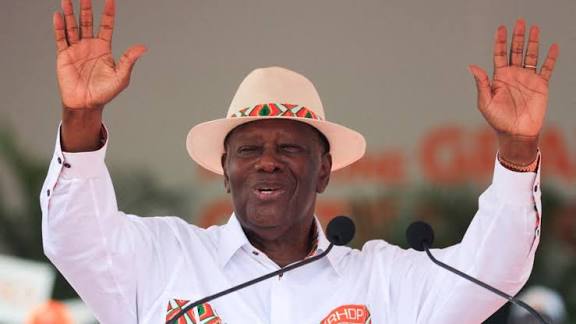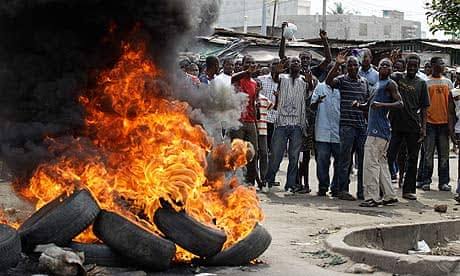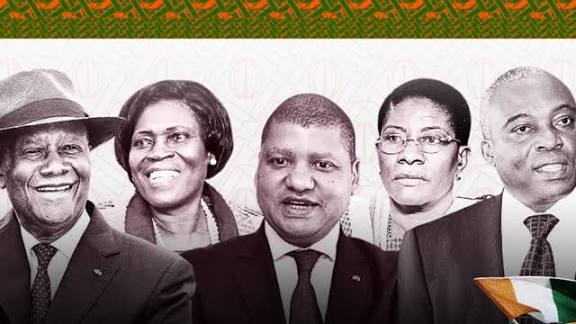President Alassane Ouattara set to begin his fourth consecutive tenure

In what marked the beginning of a fourth tenure, President Alassane Ouattara secured re-election after a landslide victory over four other candidates.
The Ivory Coast's Independent Electoral Commission, announced on Monday, October 28 that the 83 year-old incumbent had won a fourth term with 89.77 percent of the ballots cast.
Several events that happened prior to the elections led to the landslide win of Ouattara — one of which was the disqualification of individuals that would have posed a threat to his re-election.
ALASSANE OUATTARA
Before his fourth term, Alassane Ouattara had been in power since 2011, having first assumed the presidency after the contentious 2010 election that ended with the arrest of former President Laurent Gbagbo.
The 2010 election, which happened to have been one of the most violent elections Ivory Coast has ever seen triggered a chain of ugly events that led to a post-election conflict that lasted for four good months, killing around 3,000 people — highlighting the deep political divisions within the country.

During his first three terms particularly the first two, Ouattara's government was characterized by steady economic growth, significant infrastructural development, and improved foreign investment, transforming Ivory Coast — the world's leading cocoa producer into one of Africa's most stable economies. His style of Leadership attracted international recognition, particularly for economic reforms and the expansion of the country's infrastructure.
THE ELECTION
The 2025 election results which were announced on Monday, October 28, was keenly contested by 5 candidates — Allasane Ouattara the incumbent President who led the nation through three tenures, Jean-Louis Billion, the sitting Minister of Commerce who has been in office since 2015, Simone Gbagbo, former first lady of Ivory Coast (2000–2011), Ahoua Don Mello a former Minister and Henriette Lagou Adjoua of the Ivorian Popular Front. ~ AA

According to credible online reports, various candidates were disqualified — Individuals that critics believe would have made re-election difficult, if not impossible for Ouattara.
Four Prominent opposition leaders were prohibited from running, including former President Laurent Gbagbo, opposition leader Tidjane Thiam, former leader Guillaume Soro, and Charles Blé Goudé.
Thiam who was widely seen as the main challenge to Ouattara's re-election was reportedly disqualified by a court ruling that he wasn't eligible to run for President on the grounds of dual nationalism — given he was both Ivorian and French. Thiam, who was born in Ivory Coast, received French nationality in 1987 but renounced it in March, this unfortunately, didn't spare him from the court's decision to tag him ineligible.
Thiam responded to this by saying "his elimination from the electoral list by the Independent Electoral Commission [CEI] is a sad but eloquent example of Ivory Coast’s drift towards a total absence of democracy,”
Other major Ivorian candidates excluded from the vote include former President Laurent Gbagbo and his close ally Charles Ble Goude, who was charged with crimes against humanity related to the civil war.
The former prime minister and rebel leader Guillaume Soro was also barred. He was sentenced in absentia to life in prison for organising a coup.
With the major opposition figures excluded from the 2025 elections, the results were decisive and largely expected. President Ouattara secured 89.77 percent of the vote, according to provisional results announced by the Independent Electoral Commission (IEC).
POST ELECTION FALLOUT
With the major opposition figures barred from the presidential race, the 2025 elections was marked by a mix of calm and fear — probably the most peaceful elections since the 2010 elections.
According to the Independent Electoral Commission (IEC), voter turnout hovered around 50 percent, a figure comparable to previous elections in 2010 and 2015 but no where close to the 80% recorded in the 2010 elections.
Low participation in urban centers such as Abidjan’s Yopougon and Cocody was particularly evident, with some polling units reporting fewer than 50 voters by mid-day. Observers noted that while the low turnout helped prevent large-scale unrest, it also highlighted how much public disengagement and political apathy has eaten into the system.
In the weeks leading up to the election, sporadic protests had broken out in response to the ban on key contenders from the polls, prompting the government to ban demonstrations and arrest more than 200 people from campaign group the Common Front.
Authorities also imposed a curfew in the political capital, Yamoussoukro, from 10 pm to 6 am after youths ransacked the electoral commission’s office, raising concerns about potential unrest.
Human rights groups criticized the heavy deployment of security forces, which numbered around 44,000, and expressed alarm over the sidelining of opposition figures and restrictions on public assembly. Hundreds were arrested, with dozens receiving prison sentences of up to three years for offences including disturbing public order.
Despite these tensions, some observers described the election as Ivory Coast’s most peaceful in years, particularly when compared to the 2010 polls, which triggered a post-election deadlock and the deaths of approximately 3,000 people.
The government maintained that it sought to protect freedom of speech while ensuring public order, but the events underscored the fragile balance between security and political expression in a nation still grappling with divisions and the memory of past conflict.
WHAT NEXT
Ouattara's campaign this time, was heavily focused on security at a time of rising regional instability. He enters his fourth term as violence threatens to spill over from Sahel neighbours Mali and Burkina Faso, where armed groups such as Jama’at Nusrat al-Islam wal-Muslimin (JNIM) and the ISIL affiliate in the Greater Sahara (ISGS) have been conducting a violent rampage.
Since 2022, Ouattara's government has boosted the defence budget, increased troop deployment in the Northern regions bordering the Shawl, and acquired armoured tanks from leading nations like China.
Beyond consolidating his power, President Ouattara has emphasized the need to pass the torch to a new generation of Political leaders.
However, Ouattara has not named any clear successor yet, and the ruling party remains divided. This has raised various concerns, and Rinaldo Depagne, deputy director of the Africa programme for International Crisis Group, said that failure to appoint a successor could tip the country into the same kind of crisis that followed the death of founding President Felix Houphouet-Boigny in 1993, which was marked by armed conflict.
Ultimately, President Ouattara will have his fourth term, despite many findings it unsettling. However, what matters most — is how he balances security, economic growth and the grooming of future leaders, as this will determine the nation's stability and the prospects for its next generation.
Recommended Articles
There are no posts under this category.You may also like...
Super Eagles Fury! Coach Eric Chelle Slammed Over Shocking $130K Salary Demand!
)
Super Eagles head coach Eric Chelle's demands for a $130,000 monthly salary and extensive benefits have ignited a major ...
Premier League Immortal! James Milner Shatters Appearance Record, Klopp Hails Legend!

Football icon James Milner has surpassed Gareth Barry's Premier League appearance record, making his 654th outing at age...
Starfleet Shockwave: Fans Missed Key Detail in 'Deep Space Nine' Icon's 'Starfleet Academy' Return!

Starfleet Academy's latest episode features the long-awaited return of Jake Sisko, honoring his legendary father, Captai...
Rhaenyra's Destiny: 'House of the Dragon' Hints at Shocking Game of Thrones Finale Twist!

The 'House of the Dragon' Season 3 teaser hints at a dark path for Rhaenyra, suggesting she may descend into madness. He...
Amidah Lateef Unveils Shocking Truth About Nigerian University Hostel Crisis!

Many university students are forced to live off-campus due to limited hostel spaces, facing daily commutes, financial bu...
African Development Soars: Eswatini Hails Ethiopia's Ambitious Mega Projects

The Kingdom of Eswatini has lauded Ethiopia's significant strides in large-scale development projects, particularly high...
West African Tensions Mount: Ghana Drags Togo to Arbitration Over Maritime Borders

Ghana has initiated international arbitration under UNCLOS to settle its long-standing maritime boundary dispute with To...
Indian AI Arena Ignites: Sarvam Unleashes Indus AI Chat App in Fierce Market Battle

Sarvam, an Indian AI startup, has launched its Indus chat app, powered by its 105-billion-parameter large language model...
